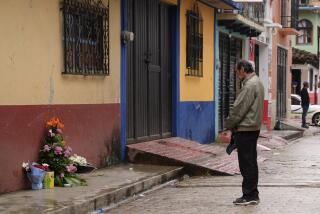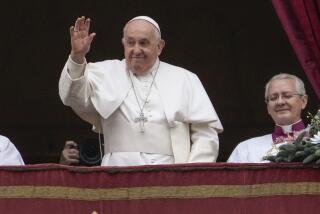Pope Appeals to Guerrillas to End Fighting, Seek Peace
- Share via
BOGOTA, Colombia — In one of his strongest appeals ever against violence and terrorism, Pope John Paul II pleaded Wednesday with “those who follow the road of the guerrilla” to put down their arms and work for peace.
The Roman Catholic pontiff, dressed in peach-colored vestments, deplored the guerrilla warfare that has plagued Colombia for three decades, exhorting a rain-soaked audience of more than 500,000 worshipers during an open-air Mass at Simon Bolivar Park “to put an end to destruction and to the deaths of so many innocents in the countryside and the city.”
John Paul’s emotionally worded appeal on the second day of his weeklong visit to the troubled South American country was phrased to apply to terrorist activities everywhere. It came just a day after he rejected requests by two Colombian guerrilla groups to mediate an end to their conflict with the government of President Belisario Betancur.
“We regret that many men in the contemporary world are allowing themselves to be seduced by violence . . . the unreasonable extremes of terrorism that leave behind only desolation and death,” the Pope declared.
“I make a vehement call to all those who follow the road of the guerrilla to orient their energy, inspired perhaps by the ideals of justice, toward constructive and reconciling actions that will truly contribute to the progress of the country.”
Commitment to Justice
But, speaking later in the day to diplomats accredited to the Bogota government, John Paul reaffirmed his commitment to the goal of social justice proclaimed by most of the guerrilla groups.
“There cannot exist true peace if there does not exist a serious commitment and resolution to the application of social justice,” he said. “In fact, justice and peace cannot be separated; a peace that does not take into account justice would be only a mirage.”
The pontiff declined to become directly involved in mediation efforts here on grounds that it is the responsibility of Colombia’s own leadership to solve the conflict and that the local leadership of the church already is working toward that end.
On Wednesday, the leaders of the legal political wing of Colombia’s largest guerrilla movement made a second appeal to meet privately with the Pope in order to get him directly involved, but the Vatican spokesman said John Paul had not seen their letter.
Crowds Line Streets
Moving briskly into what may become one of the most arduous of his 30 papal trips abroad--his seventh to Latin America--the Pope rode in his familiar white, glass-topped “Popemobile” through downtown Bogota’s streets crowded with thousands of faithful anxious to see him. He was scheduled to deliver remarks at seven locations in about as many hours.
Most of his themes were familiar ones, developed repeatedly in his statements at the Vatican and during his travels. To fellow churchmen, he denounced secular trends away from the church and excoriated both the pleasure-bent materialism of the West and the ideological materialism and atheism of the Communist world.
John Paul also reaffirmed his belief in the indissolubility of marriage and “the unity and holiness of the family against all of the theoretical and practical attacks that arise in your country.” Colombian churchmen have become alarmed at the growing popularity of birth control, including sterilization, in the past few years in this overwhelmingly Catholic country.
At the end of the day, in remarks prepared for a rally of Catholic youth in the city’s Nemesio Camacho stadium, the pontiff rebuked those who seek to join the modern trend toward instant gratification.
“The temptation to lose one’s self can lead one to lose one’s self in the alienation of drugs, alcoholism, sex and other deplorable vices,” John Paul said.
Then, returning to his theme of violence, he told the young people, “In many cases we have reached the absurd point of the struggle of brother against brother, young against young, careening through the blind violence that does not respect the law of God nor the elementary principles of human conviviality. This and other temptations become insidious.”
More to Read
Sign up for Essential California
The most important California stories and recommendations in your inbox every morning.
You may occasionally receive promotional content from the Los Angeles Times.










